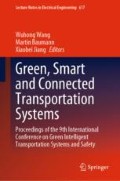Abstract
Dissension arises on whether the day-to-day route choice behavior will cause an equilibrium distribution of traffic flow on the road network, and the travelers’ decision-making mechanism of route choice behavior is still in the exploratory stage. This paper focuses on the ‘equilibrium dissension’ and the ‘decision making mechanism’ under the condition of historical experience and traffic information by conducting human-computer interaction experiments and multi-agent simulations. The results of experiments support the conclusion that ‘no convergence to equilibrium had been found’. Moreover, the simulations with the existing mechanism that perceptions of travel time being the criterion of cognition and the logit discrete choice model being the criterion of route selection support the conclusion as well, it is also found through the simulations that dissension may due to exact treatment of treatment on the probability of discrete choice model. At the same time, comparisons between experiments and simulations found that the existing mechanism was not sufficient to reflect the fact that travelers tend to choose the shorter route more, and the shorter the more when difference of routes’ length exist, The modified mechanism proposed by this paper reflect the fact better. This study is beneficial for understanding the traveler’s route choice behavior and the causes of traffic congestion.
Access this chapter
Tax calculation will be finalised at checkout
Purchases are for personal use only
References
Patriksson M (1994) The traffic assignment problem-model and method. VSP, The Netherlands
Watling D (1999) Stability of the stochastic equilibrium assignment problem: a dynamical systems approach. Transp Res B 33(4):281–312
Zhou B, Xu M, Meng Q, Huang Z (2017) A day-to-day route flow evolution process towards the mixed equilibria. Transp Res Part C 82:210–228
Zhu W, Ma S, Tian J, Li G (2016) Nonlinear relative-proportion-based route adjustment process for day-to-day traffic dynamics: modeling, equilibrium and stability analysis. Commun Nonlinear Sci Numer Simulat 40:129–137
Hazelton M, Watling D (2004) Computation of equilibrium distributions of Markov traffic assignment models. Transp Sci 38(3):331–342
Guan HZ, Pu L (2010) A drivers’ choice behavior model based on evolutionary game theory. J Beijing Univ Technol 36(8):1077–1083
Liu TL (2007) Multi-agent simulation on day-to-day route choice behavior. Acta Phys Sin 56(11):492–4986
Selten R, Chmura T, Pitz T, Kub S, Schreckenberg M (2007) Commuters route choice behaviour. Games Econ Behav 58(2):394–406
Avineri E, Bovy PHL (2008) Identification of parameters for a prospect theory model for travel choice analysis. Transp Res Rec J Transp Res Board 2082(2082):141–147
Kim H, Lim Y (2012) A Day-to-day route choice model based on drivers’ past experience. KSCE J Civ Eng 16(7):1267–1279
Chorus CG (2012) Regret theory-based route choices and traffic equilibria. Transportmetrica 8(4):291–305
Di X, Liu H X, Zhu S et al (2016) Indifference bands for boundedly rational route switching. Transportation, 1–26
Zhao C, Huang H (2016) Experiment of boundedly rational route choice behavior and the model under satisfying rule. Transp Res Part C Emerg Technol 10(68):22–37
Wei F, Ma S, Jia N (2014) A day-to-day route choice model based on reinforcement learning. mathematical problems in engineering (2014-9-30) (3)
Meneguzzer C, Olivieri A (2013) Day-to-day traffic dynamics: laboratory-like experiment on route choice and route switching in a simple network with limited feedback information. Procedia Soc Behav Sci 87:44–59
Maio MLD, Vitetta A, Watling D (2013) Influence of experience on users’ behaviour: a day-to-day model for route choice updating. Procedia Soc Behav Sci 87:60–74
Yang L, Wang H, Zhu S (2016) Summary and development trend of traffic equilibrium research. In: International conference on green intelligent transportation system and safety. Springer, Singapore, 537–548
Tisue S, Wilensky U (2004) NetLogo: a simple environment for modeling complexity. In: International conference on complex systems, 16–21
Damaceanu RC (2011) An agent-based computational study of wealth distribution in function of technological progress using Netlogo. Am J Econ 1(1):15–20
Fioretti G (2013) Romulus-Catalin Damaceanu: agent-based computational economics using netlogo. J Evol Econ 23(3):689–692
Huang H, Liu T, Yang H (2008) Modeling the evolutions of day-to-day route choice and year-to-year ATIS adoption with stochastic user equilibrium. J Adv Transp 42(2):111–127
Cantarella GE, Cascetta E (1995) Dynamic processes and equilibrium in transportation networks: towards a unifying theory. Transp Sci 29(4):305–329
Yang H, Kitamura R, Jovanis PP et al (1993) Exploration of route choice behavior with advanced traveler information using neural network concepts. Transportation 20(2):199–223
Xin-Jun LAI, Zhi YU, Jun LI (2012) Derivation, Implementation and Examination of Logit Route Choice Model with Relative Impedance. J Transp Syst Eng 12(2):85–90
Tawfik AM, Rakha HA (2014) Can we model driver perceptions? An in-situ experiment in real-world conditions. Int J Transp Sci Technol 3(2):149–165
Kim H, Oh JS, Jayakrishnan R (2009) Effects of user equilibrium assumptions on network traffic pattern. KSCE J Civ Eng 13(2):117–127
Guo X (2007) Experimental psychology
Author information
Authors and Affiliations
Corresponding author
Editor information
Editors and Affiliations
Rights and permissions
Copyright information
© 2020 Springer Nature Singapore Pte Ltd.
About this paper
Cite this paper
Yang, L., She, R., An, J., Wang, H., Zhu, S. (2020). Understanding of Day-to-Day Route Choice Behavior: Experiments and Simulations. In: Wang, W., Baumann, M., Jiang, X. (eds) Green, Smart and Connected Transportation Systems. Lecture Notes in Electrical Engineering, vol 617. Springer, Singapore. https://doi.org/10.1007/978-981-15-0644-4_13
Download citation
DOI: https://doi.org/10.1007/978-981-15-0644-4_13
Published:
Publisher Name: Springer, Singapore
Print ISBN: 978-981-15-0643-7
Online ISBN: 978-981-15-0644-4
eBook Packages: EngineeringEngineering (R0)

